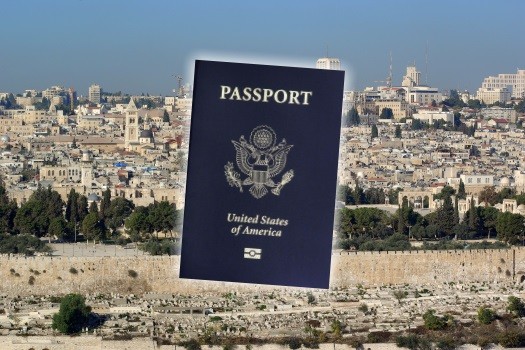
Supreme Court: Jerusalem Not Undisputedly in Israel
The U.S. Supreme Court struck down part of a federal statute Monday that allowed Americans born in Jerusalem to record in their passport “Israel” as the place of birth.
From the Jerusalem Post:
In a major blow to a 13-year-old effort to bolster Jerusalem’s status under American law as an undisputed part of Israel, the US Supreme Court on Monday struck down as unconstitutional a Congressional law which authorized placing “Israel” on passports of Jerusalem-born Americans.
The 6-3 split ruling was also a victory for the administration of US President Barack Obama, which said the law unlawfully encroached on the president’s power to set foreign policy and would, if enforced, undermine the US government’s claim to be a neutral peacemaker in the Middle East.
Liberal justices Ruth Bader-Ginsburg, Stephen Breyer, Sonia Sotomayor and Elena Kagan combined with swing justice Anthony Kennedy and generally highly conservative Justice Clarence Thomas for the 6-3 majority against Justices John Roberts, Antonin Scalia and Samuel Alito.
Justice Scalia took the majority to task for its legal reasoning, saying its interpretation that putting the word Jerusalem on individual passport documents was tantamount to recognition of Israeli claims over the city was a “leap worthy of the Mad Hatter.”
Click here to continue reading at the Jerusalem Post.
Alyza Lewin gave background on the case at last year’s National Jewish Retreat. The presentation can be viewed here, courtesy of TorahCafe.com.














SMH
how can it be that a few people have the power over the entire country and they can never be removed!!
Disappointed in Justice Thomas
Very Disappointed, especially in Justice Thomas who usually is superb in his rulings.
Milhouse
What’s your objection to this ruling? Do you agree with Roberts, Scalia, and Alito that Congress wasn’t trying to force the president to recognise that Yerushalayim is part of Israel? If so, why is this decision such a big deal to you? What difference does it make whether someone’s passport says “Jerusalem” or “Israel”, if it doesn’t affect US policy at all?
But if you think that Congress was trying to dictate foreign policy to the president, and encroach on his right to decide which foreign countries and territorial claims to recognise, then how can you disagree with the majority? If the three minority judges thought this was about that, they would have voted to strike it down too.
Agree with "Disappointed..."
I agree, Justice Thomas is usually a great justice, I can’t understand why he went sour on this one.
To Millhouse
“What difference does it make” you ask?
Are you kidding!?
Whether The US recognizes Israel’s undisputed sovereignty over Yerushalyim is not a big deal for you!?
What it says on the passport is indicative of America’s attitude towards Israel in general. If you don’t think that’s a big deal, pay attention to the news these days regarding what’s going in between said 2 countries and you’ll find out.
Milhouse
To “to Milhouse”, can’t you read? Or are you just a nudnik?
Of course whether The US recognizes Israel’s undisputed sovereignty over Yerushalyim is a big deal; but that was never at issue in this case. Everyone agrees that such recognition is entirely up to the president, and Congress gets no say in the matter. The fact is that the USA doesn’t recognize Israel’s sovereignty over any part of Yerushalayim, and has never recognized it, and that will remain the case until we have a president with the strength to stand up to the state department.
The plaintiff’s entire case was that putting “Israel” in his passport would not imply such recognition. That it’s simply a matter of getting a passport that he prefers, like a vanity license plate, with no foreign policy implications at all. Do you agree with that or not? If you don’t agree with it, then you must admit that the decision was correct and he deserved to lose. If you do agree with it, then what’s the big deal that he lost?
To Milhouse
Millhouse: “Everyone agrees that such recognition is entirely up to the president, and Congress gets no say in the matter. The fact is that the USA doesn’t recognize Israel’s sovereignty over any part of Yerushalayim, and has never recognized it.”
Wrong again Millhouse, Congress gets that right, and they’ve demonstrated what they recognize vis-à-vis Israel. The president only gets to temporarily suspend such actions. Big difference between that and exclusive right everything.
Milhouse
Sorry, you have no idea what you’re talking about. Everyone agrees that only the president sets the USA’s foreign policy, and only the president decides whether to recognize foreign governments and their territorial claims. All 9 justices agreed on that, and so did the plaintiff’s lawyers. Their entire case was that this was not about recognition at all.
Milhouse
In a major blow to a 13-year-old effort to bolster Jerusalem’s status under American law as an undisputed part of Israel,
That’s just it. That’s exactly what the majority saw that it was, and thus they struck it down. The Zivitofskys’ entire argument was that this wasn’t “effort to bolster Jerusalem’s status under American law as an undisputed part of Israel”. That is the only reason three justices agreed with them; all nine justices agreed that such an effort would be illegitimate.
To "Millhouse"
Congress passed a law.
Where in the constitution does it say the president has the exclusive right in all things related to foreign policy, including ignoring a law passed by Congress?
Milhouse
Article 2, section 3: “he shall receive Ambassadors and other public Ministers”. Recognition of foreign governments and their territorial claims is exclusively the president’s prerogative.
To "Millhouse"
“he shall receive Ambassadors and other public Ministers”
That sounds to you like exclusive jurisdiction over ALL things related to foreign policy including defying Congress??
Milhouse
Receiving ambassadors means deciding which ambassadors to receive and which to refuse. And yes, it’s an exclusive right; Congress gets no say at all in the matter. No president since George Washington has ever allowed Congress a say in the matter.
cww
I think that this is also a result partly, due to the media war. They use the media to lie to the public and so there is the problem of the public opinion.
there are some great orgs out there such as honestreporting.com and others which are trying to neutralize this, by spreading the truth and exposing the lies, but more support for them is needed.
Milhouse
What has this got to do with the supreme court? Do you think the supreme court justices are influenced by public opinion?!
To Milhouse
“Do you think the supreme court justices are influenced by public opinion?!”
You better believe they are! If not, wake up and smell the coffee.
Milhouse
They never have been influenced by public opinion before, and they show no sign of being so now. Certainly Justice Thomas has never taken any notice of public opinion, and is not about to start. He decides according to his honest view of what the law is, not what he would like it to be, let alone what other people would like it to be.